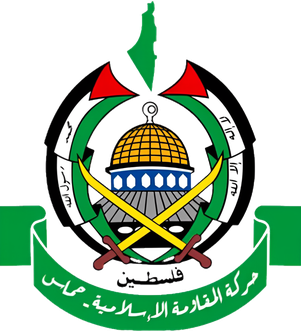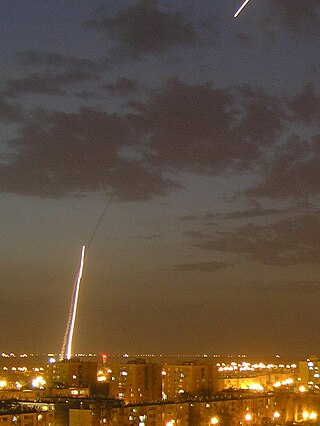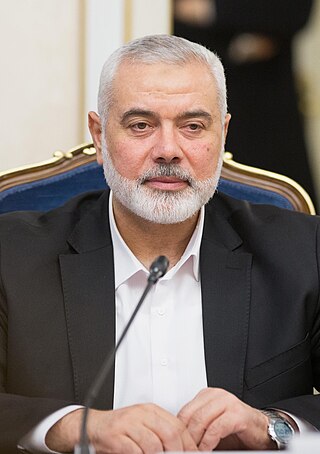Related Research Articles

The Gaza Strip, or simply Gaza, is the smaller of the two Palestinian territories. Situated on the eastern coast of the Mediterranean Sea, Gaza is bordered by Egypt on the southwest and Israel on the east and north.

Hamas, an acronym of its official name, the Islamic Resistance Movement, is a Sunni Islamist political and military organization governing the Gaza Strip of the Israeli-occupied Palestinian territories. Headquartered in Gaza City, it also has a presence in the West Bank, in which its secular rival Fatah exercises control.

The 2006 Gaza–Israel conflict, known in Israel as Operation Summer Rains, was a series of battles between Palestinian militants and the Israel Defense Forces (IDF) during summer 2006, prompted by the capture of Israeli soldier Gilad Shalit by Palestinian militants on 25 June 2006. Large-scale conventional warfare occurred in the Gaza Strip, starting on 28 June 2006, which was the first major ground operation in the Gaza Strip since Israel's unilateral disengagement plan was implemented between August and September 2005.
The History of Hamas is an account of the Palestinian Islamist fundamentalist socio-political organization with an associated paramilitary force, the Izz ad-Din al-Qassam Brigades. Hamas (حماس) Ḥamās is an acronym of حركة المقاومة الاسلامية Ḥarakat al-Muqāwamat al-Islāmiyyah, meaning "Islamic Resistance Movement".

The Gaza–Israel conflict is a localized part of the Israeli–Palestinian conflict. The conflict originated with the Israeli withdrawal from Gaza in 2005. Following the withdrawal, Hamas won the 2006 Palestinian legislative election, and a civil war between Hamas and Fatah in 2007 culminated in Hamas gaining control over Gaza. In response to Hamas's takeover, Egypt and Israel imposed an extensive blockade of the Gaza Strip that devastated Gaza's economy. International rights groups have decried the blockade as a form of collective punishment, while Israel defended it as necessary to prevent weapons and dual-use goods from entering the territory. Since 2006, Hamas and Israel have fought five wars, the most recent in 2023.

A blockade has been imposed by Israel and Egypt on the movement of goods and people in and out of the Gaza Strip since 2005. After Hamas' takeover in 2007, the blockade aimed to isolate Hamas and prevent the smuggling of weapons into Gaza. It has also led to significant humanitarian challenges, as it restricts the flow of essential goods, contributes to economic hardship, and limits the freedom of movement for Gaza's residents.

The Gaza War, also known as Operation Cast Lead, also known in the Muslim world as the Gaza Massacre, and referred to as the Battle of al-Furqan by Hamas, was a three-week armed conflict between Gaza Strip Palestinian paramilitary groups and the Israel Defense Forces (IDF) that began on 27 December 2008 and ended on 18 January 2009 with a unilateral ceasefire. The conflict resulted in 1,166–1,417 Palestinian and 13 Israeli deaths.

The economy of Gaza City was dependent on small industries and agriculture. After years of decline, economic growth in Gaza is now on the rise, boosted by foreign aid. According to the International Monetary Fund, the economy grew 20 percent in 2011, and the per capita gross domestic product increased by 19 percent.
Tourism in the Palestinian territories is tourism in East Jerusalem, the West Bank, and the Gaza Strip. In 2010, 4.6 million people visited the Palestinian territories, compared to 2.6 million in 2009. Of that number, 2.2 million were foreign tourists while 2.7 million were domestic. In the last quarter of 2012 over 150,000 guests stayed in West Bank hotels; 40% were European and 9% were from the United States and Canada. Major travel guides write that "the West Bank is not the easiest place in which to travel but the effort is richly rewarded."
The Gaza Mall is a shopping mall that opened in Gaza, State of Palestine, in July 2010.

Crazy Water Aqua Fun Park was a water park in the Gaza Strip that served the territory's small wealthy class. The park opened in May 2010 and was burned down by masked men in September 2010, after being closed by the Palestinian Hamas de facto government for allowing men and women to mingle. In July, one Australian newspaper called it "the new sensation" among Gaza's "privileged."
The Bisan City tourist village is a pleasure garden located in the northern part of Gaza.

Qatar established trade relations with the State of Israel in 1996, the first amongst all nations of the Arabian Peninsula after Oman reportedly did, concurrently with Israel–Jordan peace treaty. Until 2009, Qatar and Israel maintained diplomatic and financial relations, but due to Operation Cast Lead, Qatar broke ties with Israel. Since then there have been no diplomatic relations though there have been other links.

Islamism in the Gaza Strip involves efforts to promote and impose Islamic laws and traditions in the Gaza Strip. The influence of Islamic groups in the Gaza Strip has grown since the 1980s. Following Hamas' victory in the 2006 Palestinian elections and a conflict with supporters of the rival Fatah party, Hamas took complete control of the Gaza Strip, and declared the "end of secularism and heresy in the Gaza Strip". For the first time since the Sudanese coup of 1989 that brought Omar al-Bashir to power, a Muslim Brotherhood group rules a significant geographic territory. Gaza human-rights groups accuse Hamas of restricting many freedoms.

Rocket attacks on the neighboring cities of Eilat, in Israel, and Aqaba, in Jordan, have been a tactic used by militants from the Palestinian Islamist group Hamas and organizations linked with Al-Qaeda because of the relative ease of launching rocket attacks against these two cities from adjacent desert areas. Most of these attacks target Eilat, the last attack on Aqaba was in 2010.

Egypt–Palestine relations are the bilateral relations between the Arab Republic of Egypt and the State of Palestine. Egyptian President Gamal Abdel Nasser was a strong supporter of the Palestinian cause and he favored self-determination for the Palestinians. Although the Egyptian government has maintained a good relationship with Israel since the Camp David Accords, most Egyptians strongly resent Israel, and disapprove of the close relationship between the Israeli and Egyptian governments.

The Sinai insurgency was an insurgency in the Sinai Peninsula, Egypt, that was commenced by Islamist militants against Egyptian security forces, which have also included attacks on civilians. The insurgency began during the Egyptian Crisis, during which the longtime Egyptian president Hosni Mubarak was overthrown in the 2011 Egyptian revolution.

In November 2012, the Israel Defense Forces (IDF) launched Operation Pillar of Defense which was an eight-day campaign in the Hamas-governed Gaza Strip, which began on 14 November 2012 with the killing of Ahmed Jabari, chief of the Gaza military wing of Hamas by an Israeli airstrike.

Ismail Haniyeh is a Palestinian politician who is a senior political leader of Hamas, the current chairman of Hamas’s political bureau; as of 2023, Haniyeh lives in Qatar.
The Gaza electricity crisis is an ongoing and growing electricity crisis faced by nearly two million residents of the Gaza Strip, with regular power supply being provided only for a few hours a day on a rolling blackout schedule. Some Gazans and government institutions use private electric generators, solar panels and uninterruptible power supply units to produce power when regular power is not available.
References
- 1 2 3 "New Gaza Leisure Projects Focus on Fun Not Hardship" August 2, 2010, Reuters, New York Times.
- 1 2 "As the Israeli blockade eases, Gaza goes shopping", Donald Macintyre, 26 July 2010, The Independent.
- 1 2 translation by MEMRI, July 28, 2010, Al Ahram,